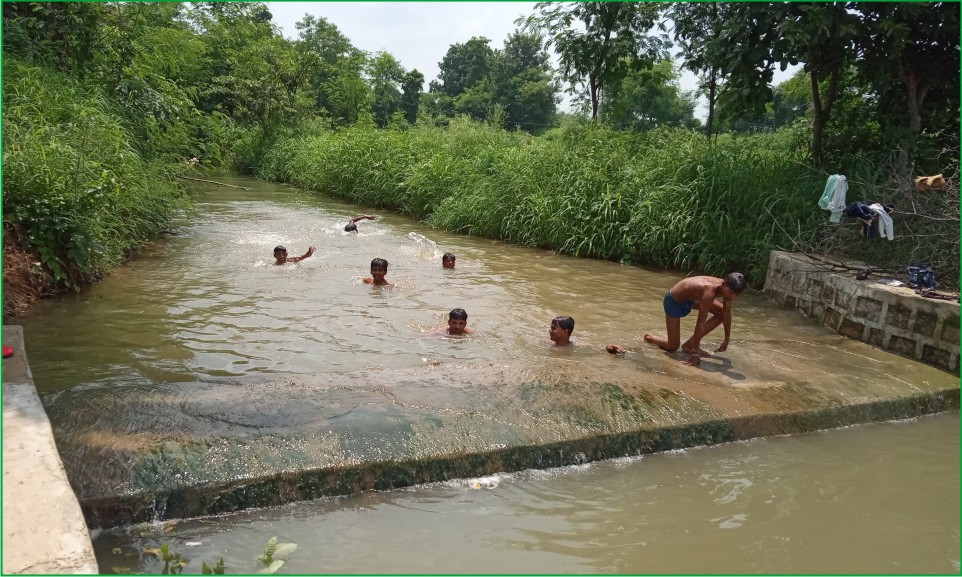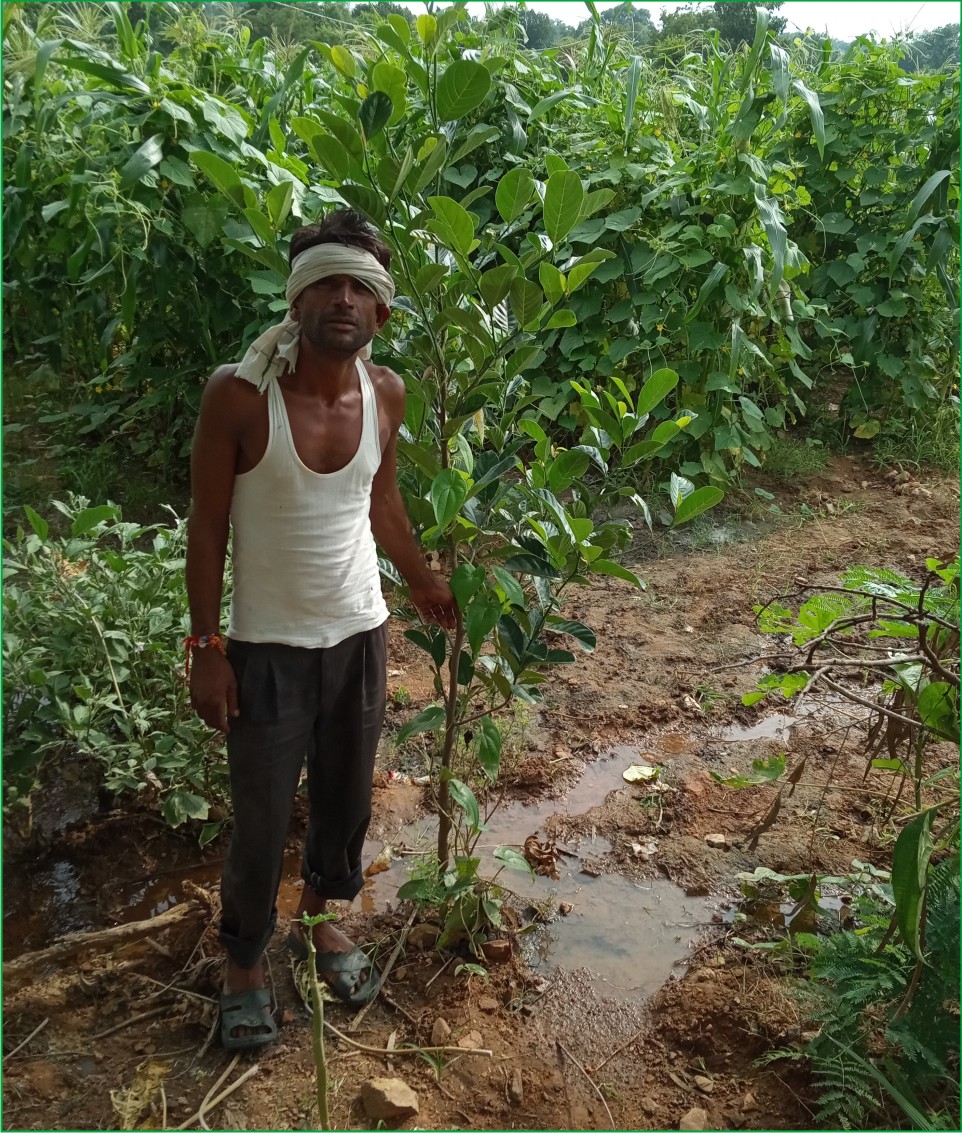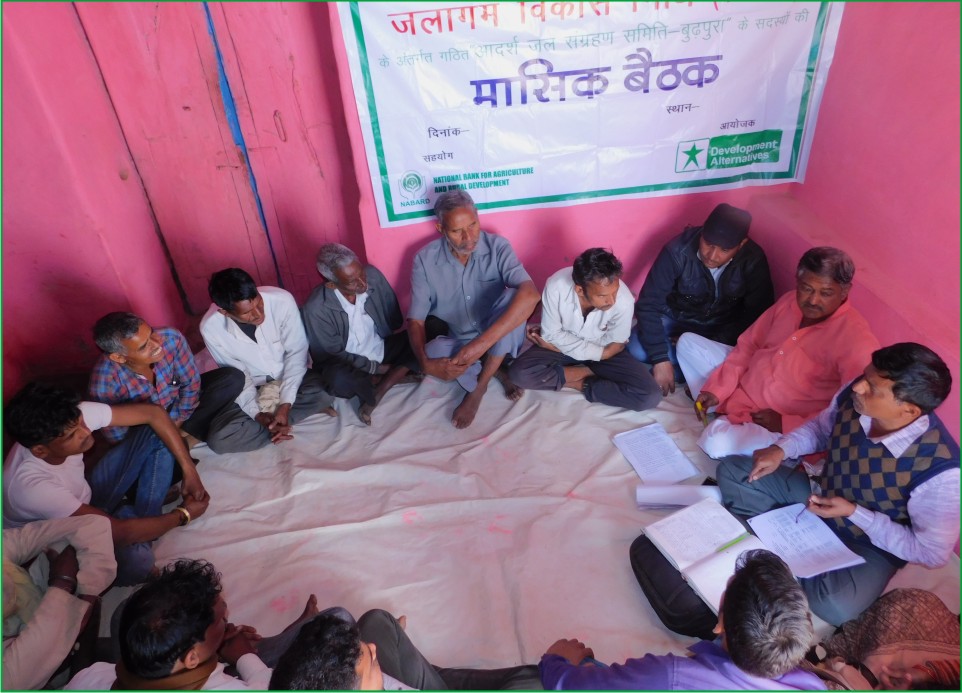|
Watershed Management
through
Community Participation
Agriculture
is the main source of livelihood for the people of Pura and Budpura
villages of the Bundelkhand region. Climate change negatively impacted
these villages that lie in the Babina block in Jhansi district, Uttar
Pradesh. The decline in rainfall and lack of water conservation
strategies and initiatives, steered up the drought kind of situation in
these villages. This further affected agricultural output as the land
under farming dwindled. Decline in agricultural productivity enhanced
the issue of food security in the region. Further, substantial reduction
in agricultural profits, endangered the financial condition of the
farmers’ families. Migration from these areas, to find alternate
livelihood options, increased sharply.

Development
Alternatives (DA) intervened and worked with the community to bring
about a positive change. The team undertook a detailed baseline study,
inclusive of community meetings to understand the existing problems and
potential solutions to them. Post this, a project for Integrated
Watershed Management through community participation, was proposed to
the National Bank for Agriculture and Rural Development (NABARD). The
above action plan was approved by NABARD from its Watershed Development
Fund. The implementation of this Integrated Watershed Project took place
through community participation by forming a water conservation
committee. Then the DA team facilitated and guided the committee to
prepare the action plan for the capacity building phase. After
successful completion of the capacity building phase, NABARD sanctioned
the Full Implementation Phase wherein the village committee took full
charge of complete implementation and monitoring of the project work by
practicing transparency, accountability, participation, ownership,
inclusion, democratic decision making and collective actions. Some of
the important components of the project are as follows:
-
 Water
Conservation Committees - In accordance with the implementation
plan, Gram Panchayats were viewed as the best place to encourage and
enhance community’s participation. Further ‘Vikas Water Conservation
Committee’ in Pura and ‘Aadarsh Water Conservation Committee’ in Budpura
were organised and strengthened. These committees were formed through
active participation of all caste, class, age and gender. They were
completely responsible for implementation and monitoring of the project. Water
Conservation Committees - In accordance with the implementation
plan, Gram Panchayats were viewed as the best place to encourage and
enhance community’s participation. Further ‘Vikas Water Conservation
Committee’ in Pura and ‘Aadarsh Water Conservation Committee’ in Budpura
were organised and strengthened. These committees were formed through
active participation of all caste, class, age and gender. They were
completely responsible for implementation and monitoring of the project.
-
Committees’ Bank Accounts - Post formation of the committees, bank
accounts were opened for them. This further assisted them in receiving
the beneficiary amount directly from NABARD.
-
Community’s Labour Contribution - A large scale community’s labour
contribution programme was organised. This was done in the presence of
Chief General Manager (CGM) of Regional Office, NABARD, Lucknow.
-
Capacity
Building Phase - Soon after the initiation of this project, 10
percent of the beneficiary’s fund was made available to the committees.
This further assisted the committees in employing the technical inputs
on water conservation provided by Development Alternatives team members.
-
Training
Process - To mobilise various implementation activities related to
watershed development, committees organised capacity buliding training
sessions for the community. Additionally, educational excursion sessions
were also organised by the committees. These efforts further expedited
the implementation process of the project.
-
Maintenance Fund - Committees set up a maintenance fund in which the
received grant was converted into a revolving fund. The targeted
audience could borrow a loan at 2 percent interest rate for a time
period of 18-24 months. Further, this conversion of the grant into a
revolving fund, addresses three critical issues. First, it increases the
number of beneficiaries benefitting from the grant. Second, the life of
the grant rises, as the interest amount received helps in maintaining
the fund. Third, it inculcates a habit among the beneficiaries taking a
loan, of paying their dues on time.
-
Maintenance of Records - The work involving maintenance of records
is carried out jointly by the committees and Development Alternatives
team members. Everyday details such as labourers’ attendance register,
work plan, meeting and training materials, cashbook and ledger accounts,
and other similar registers are maintained.
-
 Sustainable
Development Initiatives - A number of initiatives for sustainable
development were taken up. First, fodder production was promoted to
ensure fodder for the cattle throughout the year. Second, for the
maintanence of soil health, soil testing kits were purchased. Third,
targeted farmers were provided the knowledge of drip irrigation for
promotion of a new practice in vegetable production. Fourth, a farm bank
was setup at the village level to financially assist the farmers in
purchase of farm machineries. Fifth, farmers were encouraged to adopt
the practice of integrated farming system. Sustainable
Development Initiatives - A number of initiatives for sustainable
development were taken up. First, fodder production was promoted to
ensure fodder for the cattle throughout the year. Second, for the
maintanence of soil health, soil testing kits were purchased. Third,
targeted farmers were provided the knowledge of drip irrigation for
promotion of a new practice in vegetable production. Fourth, a farm bank
was setup at the village level to financially assist the farmers in
purchase of farm machineries. Fifth, farmers were encouraged to adopt
the practice of integrated farming system.
Apart from
the above initiatives, different livelihood options to the intervened
villages were made available. This was done with the help of the
committees’ and special attention given to especially the poor, landless
farmers and women, who needed an alternate livelihood option. Grocery
stores, cycle repairing shops, goat rearing and vegetable shops were
provided as a means of alternate livelihood option to the targeted
group. Self Help Groups (SHG) were setup, where sewing machines were
made available to the women, to use it for earning a living. Further
revolving funds were made available to these SHGs by linking them with
the National Rural livelihood Mission (NRLM).
■
Amarnath Singh
asingh2@devalt.org
Back to Contents
|

 Water
Conservation Committees - In accordance with the implementation
plan, Gram Panchayats were viewed as the best place to encourage and
enhance community’s participation. Further ‘Vikas Water Conservation
Committee’ in Pura and ‘Aadarsh Water Conservation Committee’ in Budpura
were organised and strengthened. These committees were formed through
active participation of all caste, class, age and gender. They were
completely responsible for implementation and monitoring of the project.
Water
Conservation Committees - In accordance with the implementation
plan, Gram Panchayats were viewed as the best place to encourage and
enhance community’s participation. Further ‘Vikas Water Conservation
Committee’ in Pura and ‘Aadarsh Water Conservation Committee’ in Budpura
were organised and strengthened. These committees were formed through
active participation of all caste, class, age and gender. They were
completely responsible for implementation and monitoring of the project. Sustainable
Development Initiatives - A number of initiatives for sustainable
development were taken up. First, fodder production was promoted to
ensure fodder for the cattle throughout the year. Second, for the
maintanence of soil health, soil testing kits were purchased. Third,
targeted farmers were provided the knowledge of drip irrigation for
promotion of a new practice in vegetable production. Fourth, a farm bank
was setup at the village level to financially assist the farmers in
purchase of farm machineries. Fifth, farmers were encouraged to adopt
the practice of integrated farming system.
Sustainable
Development Initiatives - A number of initiatives for sustainable
development were taken up. First, fodder production was promoted to
ensure fodder for the cattle throughout the year. Second, for the
maintanence of soil health, soil testing kits were purchased. Third,
targeted farmers were provided the knowledge of drip irrigation for
promotion of a new practice in vegetable production. Fourth, a farm bank
was setup at the village level to financially assist the farmers in
purchase of farm machineries. Fifth, farmers were encouraged to adopt
the practice of integrated farming system.